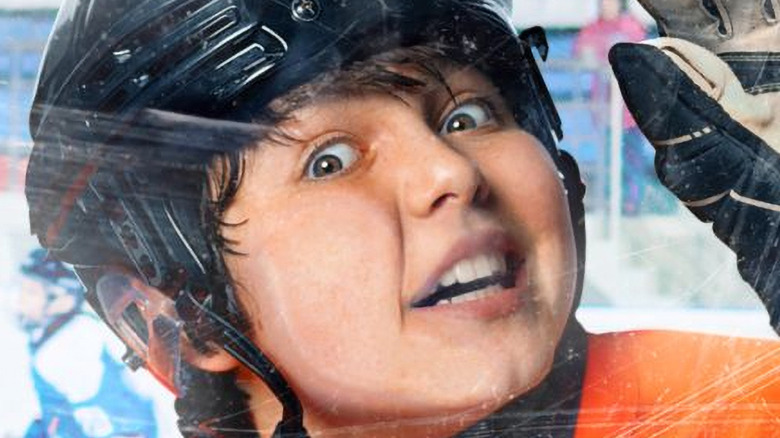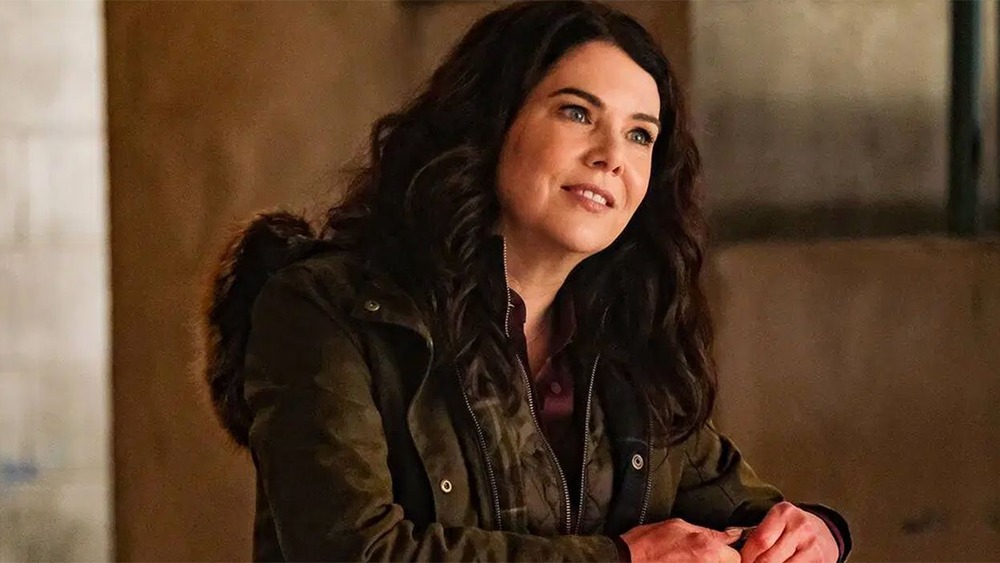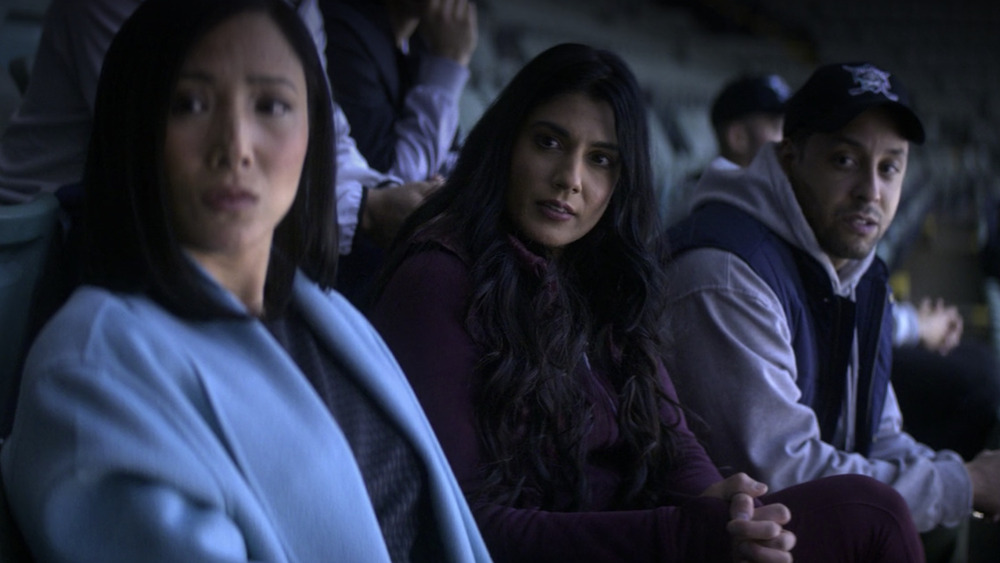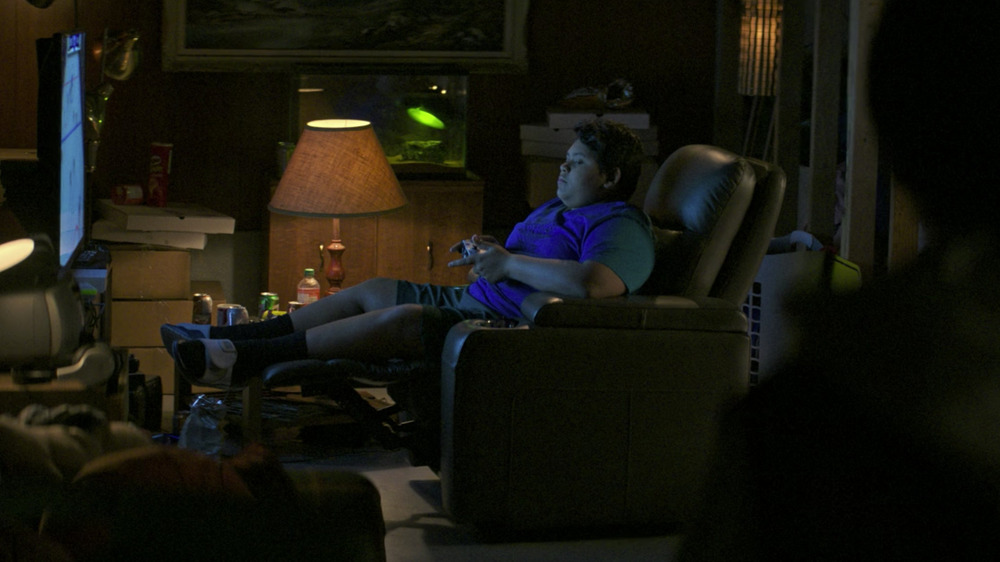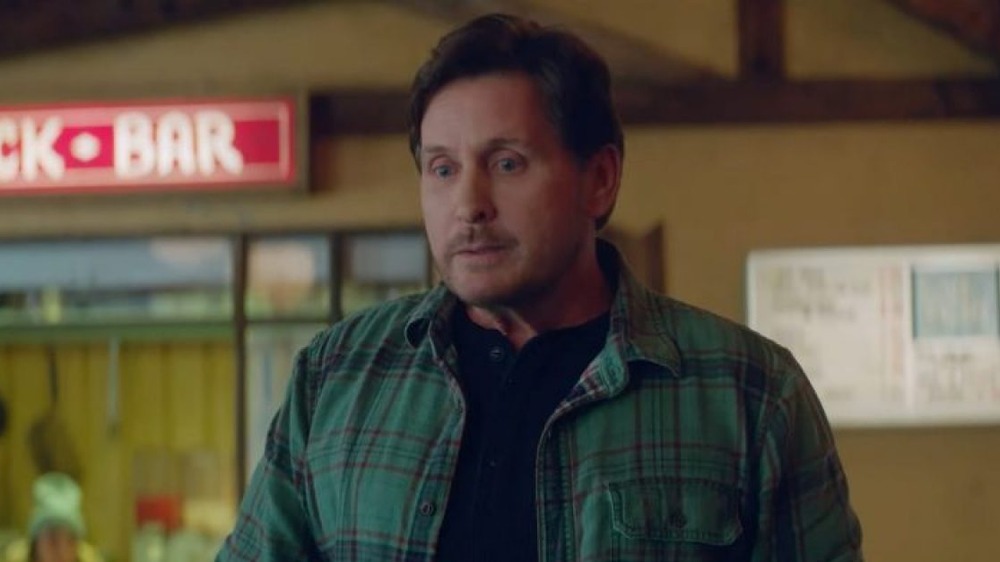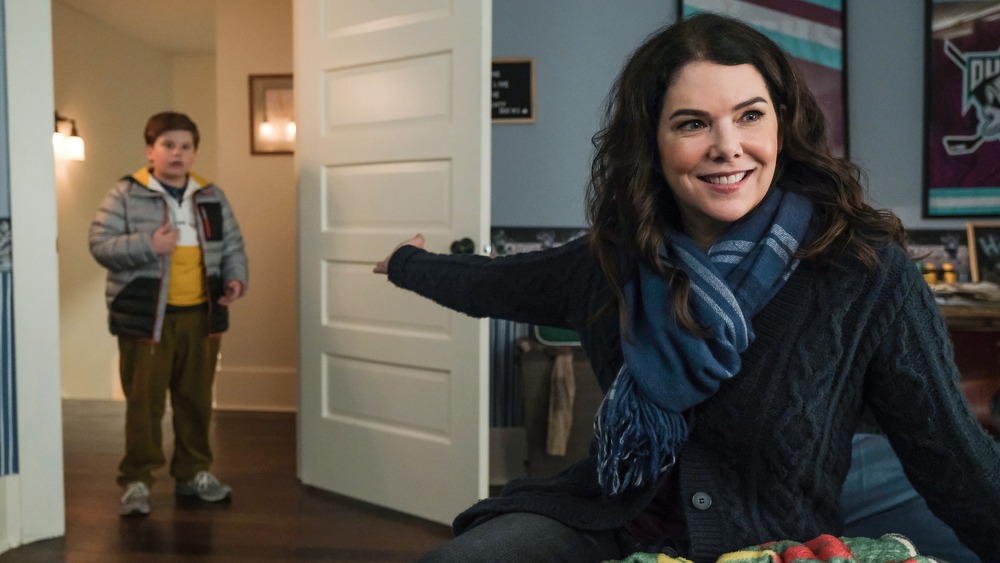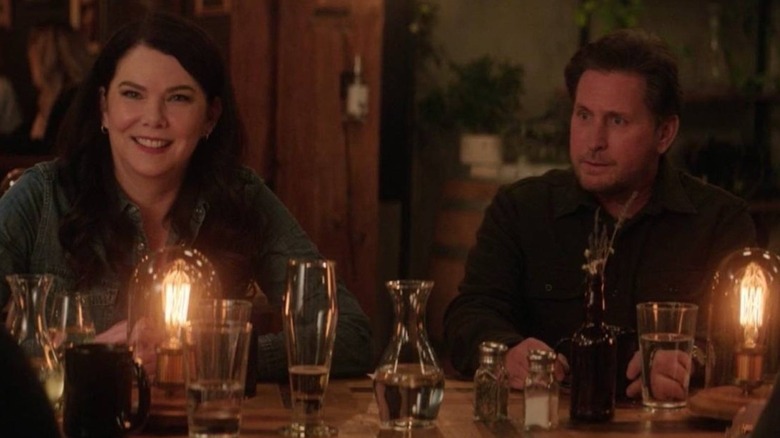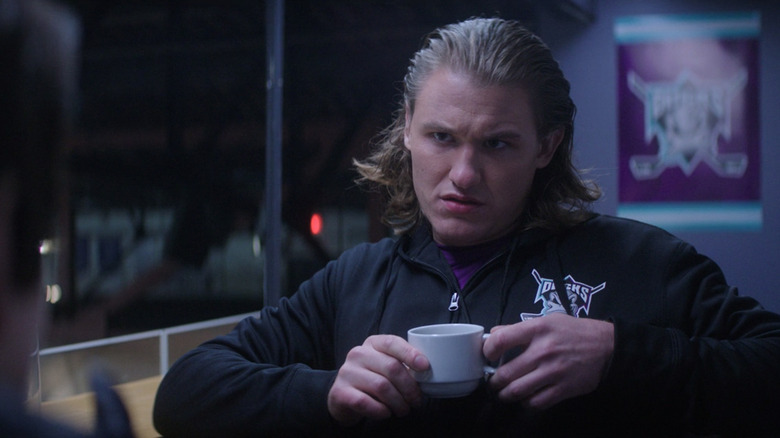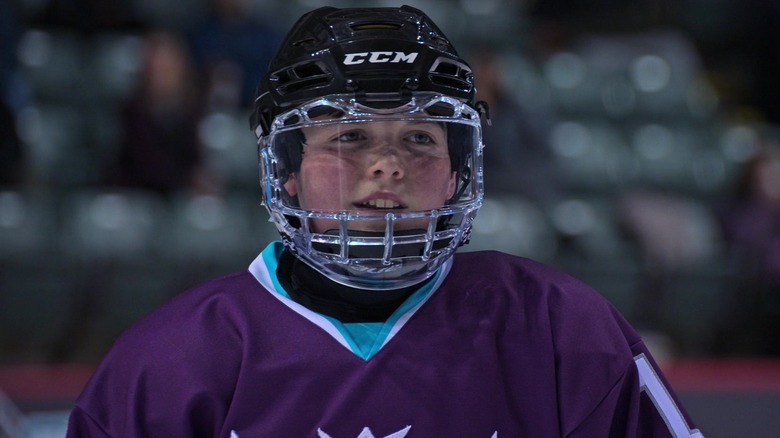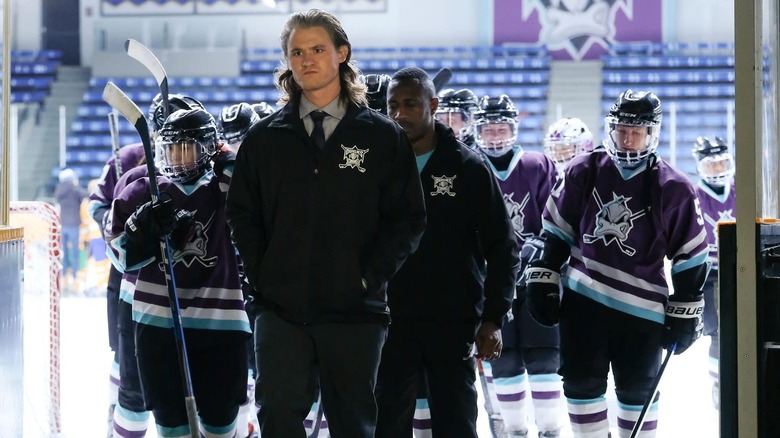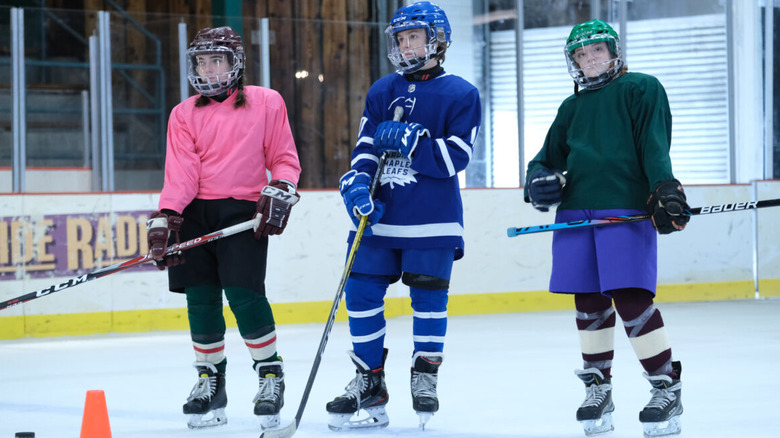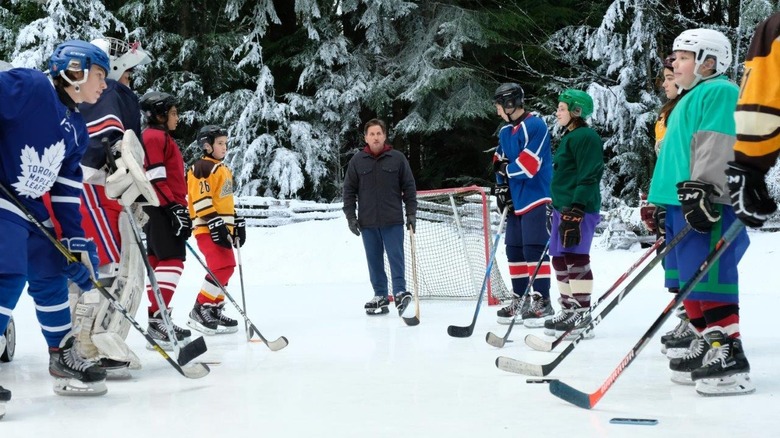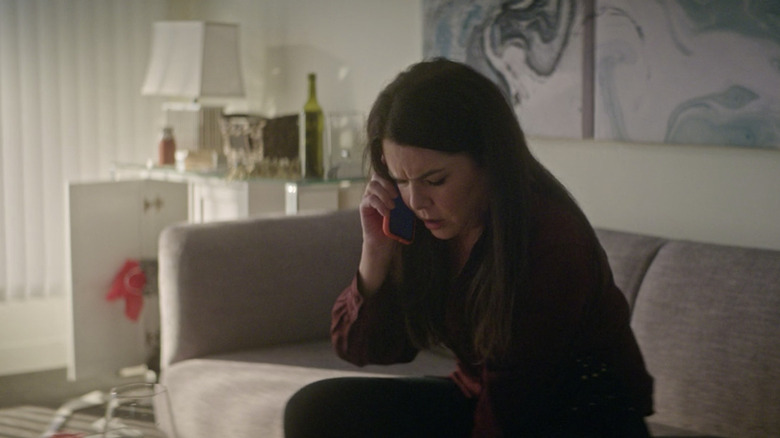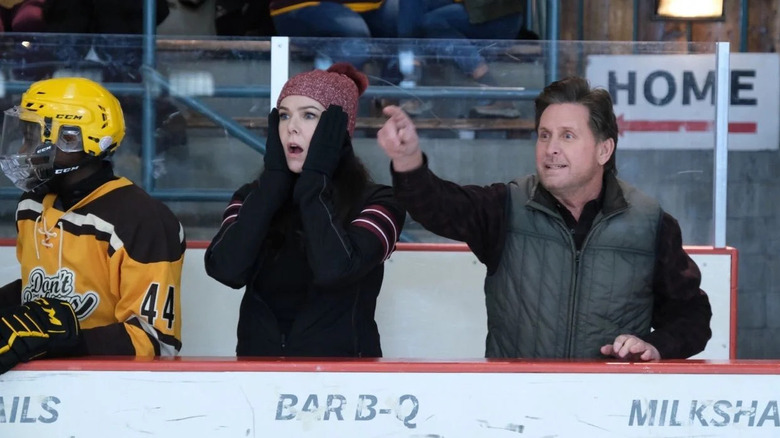Things Only Adults Notice In The Mighty Ducks: Game Changers
It's been more than 20 years since we last saw the Ducks on the ice, but now they're back ... with a twist. In the new Disney+ series "The Mighty Ducks: Game Changers," 12-year-old Evan Morrow (Brady Noon) is cut from the Mighty Ducks junior division hockey team once they move from the everyone-is-welcome 9-11 bracket to the much more cutthroat 12-14 bracket. After Evan's coach tells him not to bother with hockey any longer as he's not an all-star talent, Evan's mother, Alex (Lauren Graham), pushes him to start his own team.
Of course, in order to form a hockey team, they need three things: A coach, a place to practice, and, of course, players. Evan and his next-door neighbor Nick (Maxwell Simkins) manage to scrounge up a team, and Alex volunteers to coach. But when it comes to finding ice, they need a little help from a familiar face — Gordon Bombay (Emilio Estevez), reprising his role from the original movie as an ex-hockey player, lawyer, and former Ducks coach who now owns a struggling ice rink. The name of the new team? The Don't Bothers.
"Game Changers" is a fun series that is warmly familiar to any adult who remembers the '90s trilogy of "Mighty Ducks" films. But callbacks to the original movies aren't the only things the grown-ups in the audience will pick up on. These are the details, nods, and references only adults will notice in "The Mighty Ducks: Game Changers."
Sexism at work
In "Game On," Episode 1 of "Game Changers," we meet Alex Morrow in her workplace. A paralegal for a corporate law firm, Alex is hurrying to get out of the office in order to get Evan to practice with the Ducks. But before she can make it out the door, her boss tasks her with going through a list of tenants who need to be evicted from one of their clients' properties. When Alex tries to tell him that she can't take on more work just then and suggests a female coworker take on the task, he replies that she's already left to take her kids to practice, because "she's a great mom."
Kids will pick up on the obvious irony of the fact that the other woman has already started on the task Alex is attempting to do, but they will likely miss the workplace sexism at play. Alex, a working single mom, is expected to perform above and beyond at work — her boss calls her the firm's "most brilliant paralegal," although it's said in a tone that indicates he's saying it ironically, implying that she needs to work harder. Yet she's also expected to be a "great mom" who never misses a practice. Obviously, she can't do both — but it's clear that she's expected to. It's an impossible standard that adult women everywhere will find all too familiar.
The hockey parents aren't as out-of-control as you might think
Scenes of the parents at the hockey rink won't connect with kids, beyond the obvious fact of the parents pushing their progeny way too hard. But any parent who has had a kid compete in organized group sports will find these scenes unsettlingly familiar. Whether it's hockey, soccer, football, or any other sport, most parents know there are two types of adults who get involved in youth athletics: The ones whose kids are participating for fun, and the ones who are in it to win it.
The parents in "Game Changers" are definitely a little exaggerated — most parents have probably not already consulted a college counselor for their 11-year-olds. Still, adults watching the show are likely to either relate to Alex's laid-back approach to her kid's hockey career, or the deeply invested hockey parents who sign their kids up for $1,000 clinics and crack-of-dawn practices. While "Game Changers" definitely feels more sympathetic to Alex's point of view, both types of parents are vividly portrayed. Moreover, both types are completely real. "Game Changers" is facing reality head-on in this detail, in a way grown-up viewers appreciate.
Tracking down Koob13 is a dangerous mission
On the hunt for new team members, Evan and Nick seek out someone who keeps beating them in an online hockey game. From his username, "Koob13," they determine that he must be 13 years old, and manage to sleuth out his home address. They proceed to invite themselves over to his house and make their pitch for him to join the team. Thus, Jaden Koobler (Luke Islam) becomes their goalie.
Kids will likely accept this plotline at face value, but adults may be horrified at the implications. First of all, there's the fact that these kids assume that someone who has played over 10,000 hours of an online game is their age, based solely on the number in his name. For all they know, he could have 13 severed heads in his basement! But the thought that it may be dangerous to go to a stranger's house without telling anyone where they're going doesn't seem to occur to Evan or Nick.
Then there's the fact that they go from looking him up on their phones to knowing his home address. Even putting aside the extreme coincidence that he happens to attend their school and live within walking distance of their houses, it's troubling that two 12-year-olds can find the home address of another kid with nothing but his first name and an internet search engine.
Gordon Bombay has reverted all the way back to his character from the first movie
When Alex stumbles across the Ice Palace, she serendipitously crosses paths with Gordon Bombay, star of the first two "Mighty Ducks" movies. But when she asks to use his space for hockey practice, he refuses, telling her, "I hate hockey and I don't like kids." This line will be familiar to fans of the films — it's the same thing he says in the first "Mighty Ducks" movie when meeting his team for the first time.
While kids may pick up on the obvious callback if they've seen the first film, they'll likely miss what this suggests about Gordon himself. Last we saw him in "D3: The Mighty Ducks," he was leaving to be Director of Player Personnel for the Junior Goodwill Games Committee, putting him in charge of their international junior hockey program. Later, he returns with his lawyer hat on, arguing for the scholarships of his former players. He leaves with a smile on his face after witnessing their victory in the final game.
So what happened between "D3" and "Game Changers"? Gordon was last seen accepting a dream job to help kids around the world play hockey. Now he hates both kids and hockey again? Adults will quickly realize something significant (and depressing) must have happened to undo his character development from the first three films.
Alex's approach to coaching isn't the best
Much like the helicopter parents of Episode 1 aren't as far off from reality as kids might think, neither is Alex's chipper, trust-fall approach to coaching. While Alex is one of the protagonists of "Game Changers," she also represents the other side of the coin, with regards to parenting — and "Game Changers" makes it clear that different doesn't necessarily mean better. Episode 2, "Dusters," especially drives home how neither approach is much fun for the kids.
Just as the Ducks' win-at-all-costs approach robs the sport of joy, so too does Alex's carefree, who-cares-if-we're-good-at-all attitude. As Evan points out at the end of the episode, "We're just here to have fun" doesn't hold much water if no one is having any fun because they're getting completely annihilated by the other team. Kids will relate to Evan and the team's frustrations with Alex, but may not notice that the episode serves as a critique of winning-is-nothing parenting just as much as the previous episode is a critique of winning-is-everything parenting. While both sides are a bit exaggerated for the show's purposes, they are very much based on real parental approaches to kids' sports. "Game Changers" argues that while winning definitely isn't everything, it's still important to at least try — and that behaving otherwise isn't beneficial for kids.
Gordon Bombay has a type
Most people are probably not watching the "Mighty Ducks" films or shows out of a deep investment in Gordon Bombay's love life, but that hasn't kept it from being a recurring theme in the franchise. In the first film, he strikes up a romance with Casey Conway (Heidi Kling), Charlie Conway's single mom, while acting as the team's coach. They break up before the second film, but that apparently doesn't dissuade Gordon from falling for other parents of his players.
It's obvious from their first interaction in "The Mighty Ducks: Game Changers" that there's a spark between Gordon and Alex. Granted, in the beginning, that spark is closer to being one of annoyance. But it grows quickly and predictably into affection, and before long, it's clear that Gordon has a bit of a crush. It's a slow burn situation, with Alex spending most of the season pretending she doesn't notice his growing interest in her, but it's hard to miss, even for young viewers. However, kids are a lot less likely to pick up on the fact that this is becoming a pattern for Gordon, despite his continual claim that he doesn't like kids. While he may think that's true, his romantic affections show that at the very least, he seems to like women with kids.
Coach T's interaction with Evan is pretty inappropriate
While the tween characters of "Game Changers" seem to think, like most kids their age, that they're old enough to handle themselves, adults are more likely to realize that something seems a little off about the meeting Coach T (Dylan Playfair) has with Evan in Episode 6, "Spirit of the Ducks." First of all, it's never appropriate for an adult to arrange a secret meeting with a child, especially without the knowledge of their parents. While 12-year-olds are perfectly capable of making their own plans with friends, that doesn't really apply to grown-ups.
Then, during the meeting, in his efforts to convince Evan to return to the Ducks, Coach T gives him tips on how to manipulate his mother through appealing to her concerns as a single mom. Again, kids may not think twice about this, but adults are going to see a lot of red flags in an adult giving a child tips on how to coerce their parent into going along with whatever the adult wants. At best, he's out of line. At worst, "tremendously creepy" doesn't even begin to describe it.
The wooing of Evan back to the Ducks is gaslighting
Requesting a private meeting with a 12-year-old without the knowledge or consent of his mother isn't the only shady thing Coach T does in his campaign to get Evan back on the Ducks: He also tries to rewrite history in an attempt to make Evan doubt his own memory. When Evan pushes back on Coach T's "once a Duck, always a Duck" rhetoric, reminding his former coach that he's the one who cut Evan from the team, Coach T attempts to spin a new narrative. What he was really doing was challenging him, Coach T claims, and Evan rose to the occasion, thus implying that this was his plan all along.
Of course, while Evan can't rewind his memories to remind himself what really happened, viewers can. It's obvious in Episode 1 that Coach T's version of events is altering some key details. Cutting Evan is absolutely not meant as a "challenge" — Coach T cuts him because he doesn't think he's good enough to remain on the team, end of story. Adults will recognize this tactic as an abusive method of psychological manipulation known as gaslighting, which involves a person making someone else question their own memories or perception of reality, sparking confusion, anxiety, and doubt. Kids won't miss that something is weird in how Coach T is suddenly treating Evan differently, but only adults will be able to pinpoint just how messed up it is.
There should be more Mighty Ducks
Throughout "Game Changers," we get a glimpse of how the Mighty Ducks hockey program works, and it's honestly a little strange. Sofi (Swayam Bhatia) mentions she first started playing when she was five years old, and it's clear in Episode 1 that Evan has been playing on the Ducks for at least a few years in the 9-11 age bracket. Yet the Ducks are clearly a robust program with many state championships. There must be an older bracket beyond the 12-14 one that these players eventually graduate to, as well as brackets of younger players working their way up.
So, where are all these other teams? At the Spirit of the Ducks gala, there's no indication of any other players outside the 12-14 team. The only parents on the Ducks board are the parents of the 12-14 players, and they've all been part of the board for years, indicating that members don't have to be parents of players within a certain bracket. So do the Ducks just spin up a new team once a decade with whatever five-year-olds happen to be interested in hockey at the time? That doesn't seem practical or sustainable, and certainly wouldn't earn them as many championship banners as we see displayed around their home rink. An adult viewer can't help but wonder where all the other Ducks are, and why we don't ever hear about them.
The Don't Bothers are playing with fire with their equipment
Early on in "Game Changers," when Alex is lamenting that the Don't Bothers don't have decent equipment to play with, Gordon suggests dipping into the Ducks' lost and found and helping themselves to their forgotten equipment. Sure enough, after staging a low-key heist, the Don't Bothers strike gold and carry away sticks, helmets, skates, pads, and all sorts of other high-end gear. This enables them to practice properly, and be on equal footing with the other teams — at least, when it comes to what the players are wearing.
However, since it's implied that the Don't Bothers use this stolen equipment throughout the season, never replacing it with legally purchased equipment of their own, they're taking a huge risk — especially considering how willing Coach T is to undermine the team's chances based on any technicality he can find. All it would take is one Ducks player recognizing a helmet or stick that once belonged to someone on their team, and suddenly, Coach T could accuse the entire Don't Bothers team of theft. Fortunately for the Don't Bothers, no one ever realizes that all of their equipment is essentially stolen, or else their season could've come to a very abrupt and unpleasant end.
Those permission forms probably don't cover practice on a frozen pond
When the power goes out at the Ice Palace in Episode 7, "Pond Hockey," Gordon's solution is to take the Don't Bothers to a nearby pond to practice on the frozen ice. He pulls out his odd sixth sense from the first movie of knowing how much weight naturally frozen ice can support, and assures a doubtful Alex that the kids will be safe skating on the pond. Somehow, that's enough to convince her. Sure enough, the ice holds firm, and the kids come together as a team in the great outdoors.
However, while Gordon manages to convince Alex to let her kid on the ice, they never run this plan by any of the other Don't Bothers parents. Moreover, it's highly unlikely that those permission forms they signed consented to Alex taking their kids out onto the questionable surface of a naturally frozen pond. Luckily, nothing bad happens on the pond, but still, Alex risks parents pulling kids from the team. As a person in the legal profession, Alex really should consider more angles beyond Gordon's Spidey-sense before agreeing to his plan.
Stephanie and Alex drive to the State Tournament with killer hangovers
After Evan fires Alex before heading to the State Tournament in "Head Games," she makes the dubious parenting decision to not go to States at all, and instead head into the office. But when she gets there, she's surprised to find her boss (and cutthroat Ducks mom) Stephanie (Julee Cerda) also in the office, hiding out while her soon-to-be-ex-husband moves out of their house. The two of them bond by, judging from the looks of things the following morning, finishing off at least three bottles of wine together.
They're awakened by Evan calling first thing in the morning with an emergency, requiring Alex to hurry to States. Stephanie volunteers to drive in her husband's Porsche, implying some significant speeding, and the two arrive just in time to save the day. But while kids will likely take this whole sequence at face value, adults will realize that three bottles of wine split between two women is not likely to be something that either of them is easily shaking off the next morning. Although Alex and Stephanie cover it well, both are probably fighting major hangovers when they arrive at States. While it wouldn't be Disney+ appropriate to show, we wouldn't be surprised if that Porsche had to pull over once or twice to purge the previous night's decisions onto the side of the road.
Alex is probably not an NCAA-approved coach
In "Head Games," the Don't Bothers are nearly sidelined when Gordon admits to Coach T that he received an NCAA suspension a decade earlier, and Coach T reports him to the tournament board. Since the State Tournament is an NCAA certified event, all coaches are required to be NCAA approved in order for their teams to compete. However, Alex successfully argues that the Don't Bothers should be exempt from this rule, since their team was never scouted, and Gordon is allowed to continue coaching.
It's a victorious moment, but adults may be left wondering what the Don't Bothers would have done if a scout ever had shown up at one of their games, since it seems highly unlikely that Alex is an NCAA approved coach either. After all, she volunteers to coach solely because no one else is willing to do it. She knows nothing about hockey, and spends the whole season flying by the seat of her pants. While it's possible she could have thought ahead to complete the background check and educational course required to earn NCAA approval, it doesn't seem particularly probable that she thought that optimistically. That means that if the Don't Bothers coaches hadn't been saved on a lucky technicality, they would've been disqualified from States before even stepping foot on the ice.
